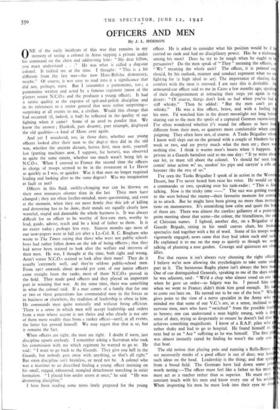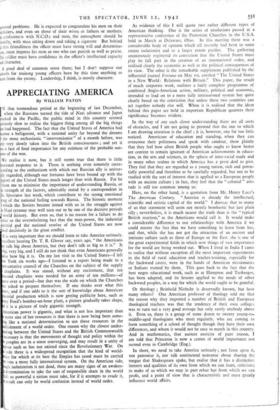OFFICERS AND MEN
By J. L. HODSON
ONE of the early incidents of this war that remains in my memory of seeing a colonel in Arras tapping a private under his command on the chest and addressing him : " My dear fellow, you must understand . . ." He was what is called a dug-out colonel. It tickled me at the time. I thought : " This is a bit different from the last war—the new Hore-Belisha democracy, maybe." Of course, it was easy to read into it a significance that did not, perhaps, exist. But I remember a pantomime, too ; a pantomime written and acted by a famous regiment (most of the players senior N.C.O.s and the producer a young officer). It had a satiric quality at the expense of spit-and-polish discipline and in its references to a senior general that were rather surprising— surprising at all events to me, a civilian. Would this change that had occurred (if, indeed, it had) be reflected in the quality of our fighting when it came? Some of us used to ponder that. We know the answer ; Dunkirk, part disaster, part triumph, displayed the old qualities—a kind of Mons over again.
And yet I wondered, too, in those days, whether our young officers looked after their men to the degree they did in the old war, whether the ancient dictum, horses first, men next, yourself last (putting machines now, I suppose, for horses), was observed to quite the same extent, whether too much wasn't being left to N.C.O.s. When I crossed to France the second time the officers in charge of troops seemed to be in the restaurant at Le Havre as quickly as I was, or quicker. Was it that men no longer required leading and looking after to the same degree? Was my imagination at fault or not?
Officers in this fluid, swiftly-changing war can be thrown on their own resources oftener than in the last Their men have changed ; they are often livelier-minded, more questioning, and even at the moment, when they see most firmly that this job of killing and destroying has to be done, their minds see equally clearly how wasteful, stupid and damnable the whole business is. It was always difficult for an officer to be worthy of first-rate men, worthy to lead, guide, advise, teach and be a kind of father to them. It is no easier today ; perhaps less easy. Sixteen months ago most of our newspapers were in full cry after a Lt.-Col. R. C. Bingham who wrote to The Times saying that those who were not public school- boys had rather fallen down on the job of being officers ; that they had never been trained to look after the welfare and interests of their men. He was, I thought at the time, both right and wrong. Aren't senior N.C.O.s trained to look after their men? They do it usually 'extremely well, and they're seldom public-school men. From 1917 onwards about 9o-odd per cent. of our junior officers
came straight from the ranks, most of them N.C.O.s proved in the field. They made good officers and they played an important part in winning that war. At the same time, there was something in what the colonel said. If a man comes of a family that for one or two or three generations has commanded men in the forces or in business or elsewhere, the tradition of leadership is often in him.
He commands men quite naturally and without being offiCious. There is a sense in which men will accept leadership and orders from a man whose accent is not theirs and who clearly is not one of them more readily than from a ranker officer—until, at all events, the latter has proved himself. We may regret that that is so, but it remains the fact.
When officers are right, the men are right. I doubt if stern, just discipline upsets anybody. I remember asking a Scotsman who took his commission with me which regiment he wanted to go to. He said: " I want to go back to the Guards. They give you hell in the Guards, but nobody gets away with anything, so that's all right."
But stern discipline isn't brainless, or need not be. A colonel who was a martinet to us described finding a young officer insisting on his small, ragged, exhausted, mangled detachment marching in strict formation. " I placed him under arrest at once," he said " He was destroying discipline."
I have been reading some notes lately prepared for the young
officer. He is asked to consider what his position would be if h carried no rank and had no disciplinary power. Has he a nicknam among his men? Does he try to be tough when he ought to persuasive? Do the men speak of " They " meaning the officers, o " We " meaning the whole unit? The officer, it is pointed ou shoukl, by his outlook, manner and conduct represent what we ar fighting for (a high ideal to set). The importance of sharing di comfort with the men is stressed. I am sure this is desirable. armoured-car officer said to me in Cairo a few months ago, speakio of their disappointment at retracing their steps yet again in th desert: " Of course, things don't look so bad when you've had stiff whisky." Then he added: " But the men can't get whisky." He was a fine officer, brave, and with a feeling f. his men. I'd watched him in the desert moonlight not long befo sharing out to the men the spoils of a captured German ration-lor I've often wondered whether it's sound for officers to have f.. different from their men, or quarters more comfortable when c. paigning. They often have not, of course. A Tanks Brigadier who I know well slept out on the ground with a couple of blankets for week or two, and ate pretty much what the men ate ; there w. nothing else. I think it warms men's hearts when it happens. private in a Guards battalion said to me one day: " If ye write a our lot, ye must tell aboot the colonel. Ye should ha' seen hi comin' intae action wi' us, smokin' his pipe and carryin' a rifle a bayonet like the rest of us."
I've seen the Tanks Brigadier I speak of in action in the Weste Desert, but I've never heard him raise his voice. He would say a commander or two, speaking over his tank-radio: " This is Al talking. Now is the tricky time —." The sun was getting rou to the west behind the enemy—their favourite moment for corn in to attack. But he might have been giving no more than instru' tions on manoeuvres. It's astonishing how calm and quiet the be of them are. There was almost the careless gallantry of a point-ti point meeting about that scene—the colour, the friendliness, the u of Christian names. I lighted, another day, on a Brigadier of Guards Brigade, sitting in his small canvas chair, his brok spectacles tied together with a bit of wool. Some of his troops we vigorously engaged; news came that they had taken such and sue He explained it to me on the map as quietly as though we we talking of planning a rose garden. Courage and quietness are oft• allies.
For that reason it isn't always easy choosing the right office I believe we're now allowing the psychologists to take some sin part in it. The boisterous Rugby player isn't always the best m• One of our distinguished Generals, speaking to me of the days wh• he was adjutant, said: " We'd a chap who almost stood on one when he gave an order—so fidgety was he. I passed him ov when we went to France; didn't think him good enough. He h to come out later on. He turned out to be one of the best." Whi gives point to the view of a nerve specialist in the Army who minded me that some of our V.C.'s are, in a sense, inclined to nervous men, men who have " switched " from the possible fearf to heroes; one can understand a man highly strung, with a de A sense of duty, trying so desperately to ensure he doesn't fail that achieves something magnificent. I know of a R.A.F. pilot who rather shaky and had to go to hospital. He found himself in next bed to an " Ace " suffering as he was himself. The first p was almost instantly cured by finding he wasn't the only one that boat.
The old notion that playing polo and running a Rolls-Royce are necessarily marks of a good officer is out of date; war kn• such ideas on the head. Leadership is the thing; and that spn from a broad field. The Germans have laid down some po worth noting : —The officer must feel like a father to -his men; must act as a teacher rather than as superior. He must stay constant touch with his men and know every one of his soldi When inspecting his men he must look into their eyes to det• personal problems. He is expected to congratulate his men on their birthdays, and even on those of their wives or fathers or mothers. m conferences with N.C.O.s and men, the atmosphere should be friendly, with men sitting down and taking a cigarette But behind ill this friendliness the officer must have strong will and determina- ion, must impress his men as one who can punish as well as praise. The soldier must have confidence in the officer's intellectual capacity Ind character. • A good deal of common sense there; but I don't suppose our schools for training young officers have by this time anything to inirn from the enemy. Leadership, I think, is mostly character.



























 Previous page
Previous page